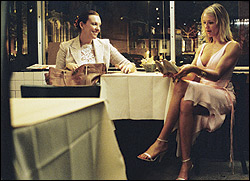Wait a minute—Cameron Diaz is Jewish? Suddenly I feel a spiritual crisis coming on. Maybe there’s something to all this Kabbalah stuff. Hebrew can’t be that hard to learn, right? These are among the many questions raised by In Her Shoes (which opens Friday, Oct. 7, at the Meridian and other theaters). Jennifer Weiner’s 2002 source novel has been—how to put this delicately?—somewhat de-Semiticized in Curtis Hanson’s adaptation. But the ethnic and sisterly strains of guilt are pretty clear: Older, smarter Rose Feller (Toni Collette) works as a Philadelphia attorney, while her party-girl kid sis, Maggie (Diaz), shags strangers in the men’s room during her 10th high-school reunion and can’t hold down a job. Their widowed father (Ken Howard) has remarried a harpy, their mother having long ago died under vague circumstances. The movie’s central metaphor—metonymy, almost—is the sisters’ identical foot size and insatiable fixation: shoes, which hardworking, manless Rose can afford and perennially broke man-magnet Maggie pilfers from her closet. So, you see, each sister needs to learn something from the other, forgive old grudges, discover new familial connections, walk a mile . . . and then some. Oh, and we in the audience also need to have a good cry.
That’s a bit of a reach in the well-stocked bookshelves of director Hanson (Wonder Boys, L.A. Confidential), and Shoes should be nothing more than a collision between chick lit and a tissue box, a perfect storm of tears and paper. But he has a healthy respect for genre and Hollywood history. He knows this is a classic “women’s picture” of the sort once regularly (and profitably) made during the high studio era, before action flicks and male-bonding movies essentially drove women, well, to the bookstore. Shoes covers no new ground, but it’s emotionally satisfying ground, closer to Terms of Endearment than Beaches.
The next stretch after accepting Diaz’s character—not the being gorgeous part, which she pulls off with her usual blithe “Who, me?” authority—is Collette being the frump. In a sisterly fight, this time over men, not shoes, Maggie calls Rose a “fat pig,” and the scene sticks for two reasons. One, Collette did gain weight for the role (as in her Muriel’s Wedding breakthrough), but she still looks better than us mortals in the audience. (Dowdified as she was in About a Boy, when Rose goes on sabbatical from her law firm, Collette’s gradual makeover includes running around Philadelphia as if she’s Rocky; but she stops short of sparring in the meat locker.) Two, as usual, Collette kills in second-banana roles—recall her desperate housewife meltdown in The Hours. For Rose, “fat pig” isn’t what stings; she’s more crushingly disappointed in Maggie’s schoolgirl taunts, sad that her dyslexic sib can’t even dis properly. It’s like the shame of having a ‘tard in the family.
And yet there is still more shame in the Feller closet, more secrets, which Maggie discovers while riffling through her father’s drawers in search of cash. Evicted by Rose, she hightails it to Miami to mooch off her newly discovered maternal grandmother, Ella (Shirley MacLaine). If Rose had run out of patience with Maggie’s smiling delinquency, Ella has none to begin with. Maggie first seeks to give all the surviving men in Ella’s retirement community heart attacks by sunbathing at the pool. When she runs out of money, however, Ella puts her to work. For the first time in her life, unable to sponge off eligible men (i.e., any guy under 70), Maggie has to employ her brain. There’s even a blind, beatific codger, played by Norman Lloyd, who has her read Elizabeth Bishop and e.e. cummings to get over her dyslexia—it’s that kind of a movie. But, that said, Diaz is effective and free of vanity playing dumb, when she could’ve coasted through her part.
Since Maggie is a clothes nut and shoe thief, there’s a temptation to simply let the camera run while Diaz vogues in front of mirrors in her undies and Jimmy Choos. Happily, Hanson does not resist this temptation. Catharsis is fine for the ladies (and there’s a lot of it at 130 minutes), so I think this is a concession for the husbands and boyfriends who may be dragged along to Shoes. Weiner’s novel does also require a few men in its Austen-esque plot engineering. If the two sisters are out of Sense and Sensibility, Rose’s handsome boss Jim is the movie’s Mr. Collins and her shy fellow associate Simon (Mark Feuerstein) its Mr. Darcy. Simon may be a sensitive dweeb who drives a Prius, but he’s also a serious foodie, which eventually impresses Rose. For male viewers who’ve failed with the Neil Strauss’ The Game approach to picking up women, the lesson here is to head to the cookbook aisle instead.
Some of Shoes is lined with fluff: Rose and a gal pal succoring themselves with both Häagen-Dazs and M&Ms; Maggie ineptly washing a dog in a pet store like Lucille Ball being engulfed in bubbles; Ella and Maggie bonding over Sex and the City; and Ella’s wacky-wise neighbors in Florida, stealing scenes like a Golden Girls reunion. (Though, for once, MacLaine is generous and relaxed enough to let somebody else do the larceny.) Too much is made of the girls’ awful step-mom and her supposedly awful daughter; then there’s too little payoff to all their complaining.
But there’s also a hard leather truth wrapped around the movie. “You’re not going to look like this forever,” Rose scolds Maggie, who’s later more receptive to that wisdom from Ella’s foot-in-the-grave cronies. Meanwhile, Rose continues her makeover in Philly (one step closer to Maggie’s shoes), and Maggie starts a responsible business in Miami (vice versa). You don’t need me to tell you that there’s a crisis that forces the two back together, or that hugs and tears will follow. Both need to let go of their old hang-ups and identities. Or to quote Diaz (quoting Elizabeth Bishop): “The art of losing isn’t hard to master.”








